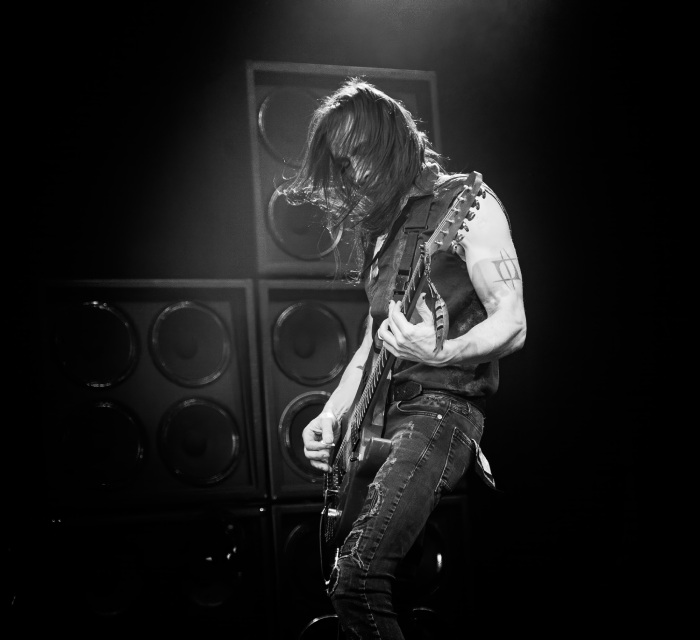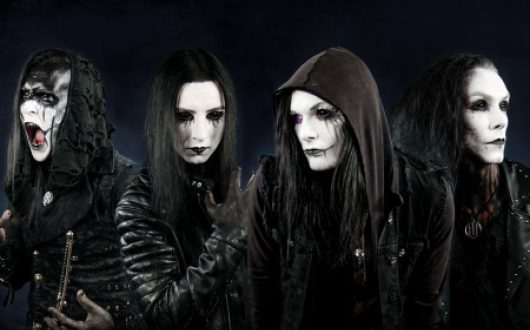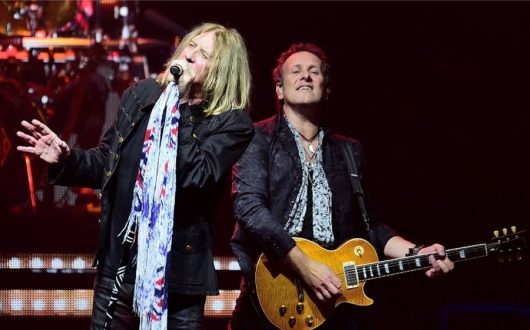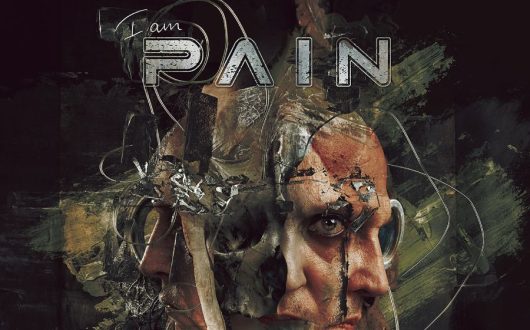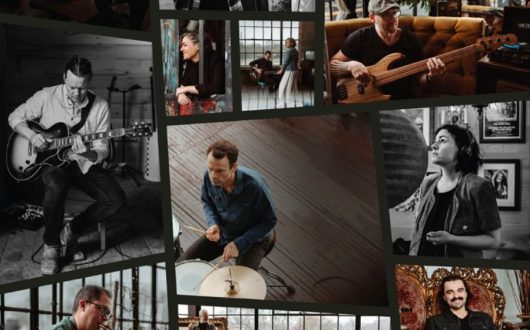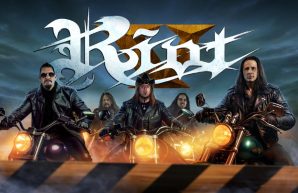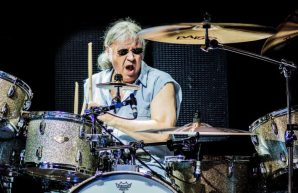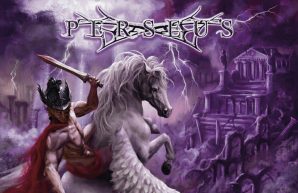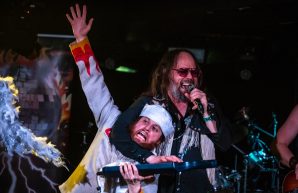Interviewed by: Adrian Hextall
Adrian Vandenberg released his second solo album with his band Vandenberg’s MoonKings simply called MK II late last year. Mixing blues with 70’s rock designed to deliver a soulful, melodic, and authentic sounding CD, the album sees the band really carving out their own identity. With vocalist Jan Hoving really stepping up to the plate and hitting home run after home run on songs like “Love Runs Out” and “What Doesn’t Kill” it’s an album that showcases the band’s blues bravado and unbridled passion.
Adrian formed Vandenberg’s MoonKings in 2013 with Jan Hoving on vocals, Sem Christoffel – on bass and Mart Nijen Es on drums. With live shows all too infrequent, we managed to catch up with Adrian before his recent show at the Underworld in London’s Camden Town.
AH: Excellent. So, new album. Recorded, as I understand it, where you first started back in, what was it ’78? With the Teaser album, same location.
AV: Yes.
AH: What’s changed? Does it still feel like the same studio you went to record in those years ago?
AV: Yes it does, because they kept the basic structure and actually the typical 70’s concrete blocks inside the studios were on there, in those days, architecturally, it was the hip thing to do.
You can recognize 70’s buildings because of those concrete blocks. Inside it’s still the same, they re-did the actual studio rooms to modern day standards but the vibes are still the same, the restaurant is still the same. It is strange because with the MoonKings albums we did the same things in recording and that was really weird because– well, weird is not the right word but it was very special because I realized on the first day when we were recording, I thought “Man, there’s something that is familiar-ish” I knew it was the studio but what I didn’t realize is they have four studio rooms in there and we were working in the same studio as what I recorded the first album with, the Teaser album in ’77.
Once I started recording acoustic guitar in there I was using a Neumann microphone, which is like a leading vintage type of microphone brand, German thing. I looked at it and I thought “Wow, I’m really curious if it’s the same microphone” because I vaguely remember a picture of me on that 70’s record, I put a band together called Teaser, and I remember, in one of my scrapbooks I had a picture of me playing a couple of piano parts on a couple of the songs and I looked the picture up and the same microphone was hanging over the piano that I recorded the acoustic guitar with on both this album and on the first MoonKings one, and I could recognize it because right next to the label there was a little dent. That’s why I knew it was the same one. It’s very special, it’s like one of those cliché things, like a round circle you know “The circle is round”, but this is very special.
AH: Did it offer any additional inspiration to you whilst you were there? Did anything else come out of the songs where you thought “You know what, this is just the right setting for me as an artist”?
AV: Yes, in a way, because my heart is still in this kind of music. Subconsciously actually, because I’m back in the same blues-related rock that I love to make and that I’ve always made but with Vandenberg or Teaser I enjoyed injecting a little more classical harmonies combined with blues rock. After a while, when a lot of people started doing that I got off that path. I wanted to go back to more organic blues rock like what I’m doing with MoonKings.
It felt very natural to be in that same studio, in the same studio room as well, with the same equipment, but I only realized that during the process, that there was something like “feeling at home” type of thing, even though I don’t really like the vibe of that studio. For this album we recorded the basic tracks and some vocals in another studio in the middle of nowhere in Holland. A place the studio owner built for himself, he writes music for films and stuff. Inside it looks like a scene out of a Harry Potter movie. It’s like one of those British library type of vibes, and it’s just really nice, I really enjoyed working there too. After all those years I finally start understanding why some bands move from one studio to another. Just to change scene and a different vibe around the whole thing.
AH: Put your head on a different space.
AV: It really does. I enjoyed this combination, I think for the next album I’m definitely going to do this again.
AH: In terms of the approach on this second album from MoonKings. Listening to Jan’s voice this time around. I remember when I reviewed the first album thinking “It felt like it was almost going out of his way to sound like your former colleague Mr. Coverdale.”
AV: Yes, that’s what a lot of people thought, but the thing is– obviously you are indicating that on this album–
AH: I felt like he’s found his own style this time.
AV: He realized it too but he did not try to copy David or something. He’s got his voice, if he would have had a voice like Vince Neil or something, nobody would have drawn the conclusion but the combination of my past and the timbre of Jan’s voice and me writing the songs makes it logical. But you are right, I realized I could see him grow during the shows that we did. For the first MoonKings album, we hadn’t done any gigs and he hadn’t done any gigs really for years, he’s just busy with the farm, he got this big farm. Right now what I find really interesting is that in the beginning, I think the comparisons were very logical, my past, and the kind of music that we play, but right now, what I find really interesting is more and more comparisons with different people. A lot of people, like you said, go “He’s grown more into his own style” but what I find really interesting is that some of the reviews it says “He reminds me of Chris Cornell” and another one says “He reminds me of Ronnie Dio” and other one says “He reminds me of Coverdale” and another one– so the more influence is the better actually, because that means that you can hear those influences but it’s still his own because there’s so many columns that you can hear.
AH: One of the ones you’ve not mentioned and one of the sounds that I heard on some of the songs on there, Inglorious own Nathan James.
AV: It’s interesting yes because Nathan is joining us next week when we play in the Underground, he’s going to be a guest in one of the songs.
AH: Feels like a natural fit to the music you’ve got on this album.
AV: Yes, I think so too. I was very familiar with him because in Holland people don’t know about him yet, he has a great band and he’s a great singer. The promoter would suggest that “Nathan really would like to come down” and then he said “Well, he’s a huge Whitesnake fan” and Nathan said “Can I join on a Whitesnake song?” so we are going to do that.
AH: He wear’s his heart on his sleeve and say he just wants David’s job. It’s all he ever says, every time I see him “I just want Coverdale’s job”
[laughter]
AV: He seems like a really nice guy.
AH: He is, definitely. In terms of the star on the new album, I’ve actually written that bluesy feel to me feel like it shines through more time as well. If anything, if you look back at your history, it’s more in keeping with Restless Heart, than it would be with say, the earlier Whitesnake’s period.
AV: Yes, definitely. In the end you have a natural path, mine has always been based on what Cream did, and Free and Bad Company, and Led Zeppelin, it’s always heavy blues rock type of stuff and sometimes I realize, nowadays that I try to take one or two side roads try a little bit injecting classical influences or a little bit more melody or whatever on the song like “What Doesn’t Kill You” for instance it’s very different than the song “If You Can’t Handle The Heat” for instance on this album. I like to take little side roads but always come back on the blues rock road that’s organic and it feels natural to me.
AH: You said about the influences there, listening to “All or Nothing”, you brought out your inner Hendrix on the guitar there.
AV: Yes, definitely the sound– some of it I uses strat and when I play on a distorted strat I always want to tip my hat to Hendrix, he’s probably my biggest hero I suppose.
There are so many great guitar players, intimidating if you really think about it. Sometimes I find myself thinking “What the hell am I going to add to all these great guys” but then I realize that’s not the reason why I play, I play because I love it, and I love the way I can express myself through a guitar and through writing songs. Sometimes, I can remember periods where I got intimidated, guys like Schenker or Hendrix or Eric Clapton or whatever I go “Oh man gees, these guys are so fucking good, what am I going to do with this fucking guitar” then I got a guitar on my lap and I just play and I’m happy so I think “I would do it anyway”.
AH: You must have that point where you must realize that actually there’s nothing to worry about because you are that caliber of player anyway.
AV: Well, that’s when I started realizing I don’t consider myself on that caliber because I don’t think you can judge that yourself, but I do realize over the last 30 years I got a lot of mails or stuff from people who say that I was a reason that they picked up a guitar or I was an influence or something and that’s when you realize “Oh, probably I’ve got more to say on my guitar than I thought so of myself or something” because you kind of forget it. I’m still a fan, when I run into people like Brian May or like Jimmy Page, I got to meet Eddie Van Halen, I got to meet all those guys over the course of years and I feel like a fan then, I got to keep myself, my cool or something, because that’s the way it is. I just love music and I love making music and I’m a fan of these guys. It’s kind of funny for me to realize that there are people who look at me that way too, because I don’t see it like that.
AH: I wonder how many have those conversation with these guitarists, where everyone ends up saying “I also really like this solo on this track” from them to you, so it works both ways doesn’t it?
AV: It really does, definitely. The sound is good, it’s also very motivational, it gives you some kind of confirmation that you are doing something right somewhere.
AH: It’s a justification for why you got into it in the first place “I must be doing something right because these people like it”.
AV: Yes, that’s how it is.
AH: You mentioned Eddie Van Halen there. One of the tracks on the album “If You Can’t Handle the Heat”
AV: The last one.
AH: You really let yourself go for it a little but don’t you?
AV: I completely.
AH: You’re not squeezing yourself into the song or anything like that it’s just your opportunity to just “You know what, I’m going to let the guys in the band play”
AV: Yes, that’s what I said. I got the bass player and drummer to jam on the outtro of “The Fire”, the song, so when I was recording the last song I thought “Gee we got a lot of jamming on this record because the end section of Reputation is a bit of jam too”, but not like an instrumental one but just three of us going berserk and then I thought “Well, we got a jam between the bass player and drummer, we got a band jam, it’s about time, for the first time on my career when I let myself go for a change”. Because I’ve always loved to make like a short solo as a part of the song instead of just wheeling away like a lot of players do, because I look at the song as a song and not as a platform to show off. So the end section of “If You Can’t Handle the Heat” asked for it, I felt like “Fuck it, I’m going to go berserk”.
AH: And why not.
AV: Yes, why not?
AH: And by putting it at the end of the album, it’s almost like your signature then.
AV: Yes, you could look at it that way, it’s interesting.
AH: Tell me a little but about “What Doesn’t Kill You” because there are so many layers to it. There’s this string sound in there as well and additional backing vocals from somebody and I’m just curious to know who has done that.
AV: It’s a black girl and she sings on a couple of the songs but I wanted to make it very subdued because we don’t have a backing singer in the band. The tone of her voice mix really nice with Jan’s voice, plus Jan also sings a backing vocal so he kind of bridges those things together. In “What Doesn’t Kill You” it blends together very well. When you hear it for the first time, you don’t think right away “Oh, there’s backing vocals in there”, you realize it a little later, at least that’s what I tried to achieve with it.
AH: I would say it was probably my second or third run through the album and then I started “Oh hang on”, you certainly start to take it apart a little bit and pay it a bit more “There is something else there, isn’t it?”
AV: And she’s great. She’s a black rock singer and she got a great voice and she does a lot of background voices. She wants to be like Skunk Anansie, she shaves her head and stuff, it’s a lot of fun and she’s a great vocalist. Jesus it’s a breeze working with her in the studio.
AH: What’s her name?
AV: Sarina Voorn.
AH: She’s done a great job there, it really ads a bit of extra depth to the tracks doesn’t it?
AV: It’s what I tried to achieve, I’m glad it worked out.
CHECK OUT A VIDEO BELOW IF SARINA PERFORMING ON NATIONAL TV;
https://youtu.be/lQd4XwjEBDo
AH: Looking at the times as well when you’ve played with David [Coverdale], you keep popping up in his career as well. I saw you back in 2011 at Sweden Rock. I was there in the crowd and of course he brings you on and he brings BernIe on as well, that was a pretty special night.
AV: Yes, it was a lot of fun, it was really cold too. The thing was, in Holland there was really nice weather so I assumed– I didn’t even check on the weather I thought “Oh it’s probably the same weather as over here”. I didn’t bring anything, I was fucking freezing and we were on stage late it was like 12:30 to 1 o’clock or something and the restrooms weren’t heated either so it was just really cold. Oh man, I thought my fingers were frozen, but a lot of fun though.
AH: It was, it was such a great response from the fans when you came on stage as well. Does it make you miss it? When you get that response from the guys?
AV: Definitely yes. I really enjoyed with MoonKings because we played on Japan twice and both times, first couple of rows people were crying some of them. I hadn’t been there since 1997 or something, and the fans over there are really loyal. There’s a bunch of people over there who grew up with my music. It’s pretty moving because those are the moments when you realize that you mean more in some people’s live than you realize yourself, what we were talking about earlier, and that also pushes my face right in the motivational factor that I always feel I have a certain responsibility to people who don’t get as far as I did in my career because there’s so many great musicians, great guitar players everywhere, drummers, vocalists, and the people are never going to hear about. I always feel really fortunate that I can still do what I love doing most and go a great length to keep doing it.
AH: I’m not surprised. You mentioned they got some of the most loyal fans, and you said you leave for 20 years and they’ll make sure they still come out to see you.
AV: Yes, it’s amazing. Very nice, polite, people there.
AH: One final question and something that keeps cropping up, there’s always talk of an acoustic tour with David?
AV: Yes, there’s no plans for it but David and I have been talking about that since we did stop in Tokyo. Sooner or later we would maybe do something like that if it goes with both our schedules. Right now David is going to come out with a new album early next year or this year I think and I’m touring on this album so right now it wouldn’t work, but sooner or later we may do that.
We’ve always talked about it, but we don’t know. It’s hard to predict if it’s going to be in the near future or whatever. We enjoy it. We did a couple of shows acoustically in Germany and Poland, radio stuff, and it’s pretty relaxed, specially for David it’s really relaxed because you don’t have to scream against all these mics, you can just sit down and I’ve always loved his voice in the middle range, he’s got this big resonating “ra ra ra” and I always thought that he should do more with it because not a lot of rock singers– I can hardly name anybody apart from Jan the singer of MoonKings, who also sounds that good in that range.
AH: He can’t possibly want to be trying to howl “Still of the Night” up there all of the time whereas with an acoustic show it allows a bit of rework on the songs as well, a whole new flavor to them.
AV: Yes, I’d love to do it. With MoonKings on this tour we do two songs acoustically in the set. Jan and I really enjoy it, and it’s a great moment in the show because you pull it all the way down and then you build it up again, it gives a lot of layers to the show, which is nice. I enjoy it.
If you got to enjoy the show at the Underworld, congratulations. Word on the street is that it was some show. Here’s a handful of live clips from the show including Nathan’s appearance on ‘Here I Go Again’.

